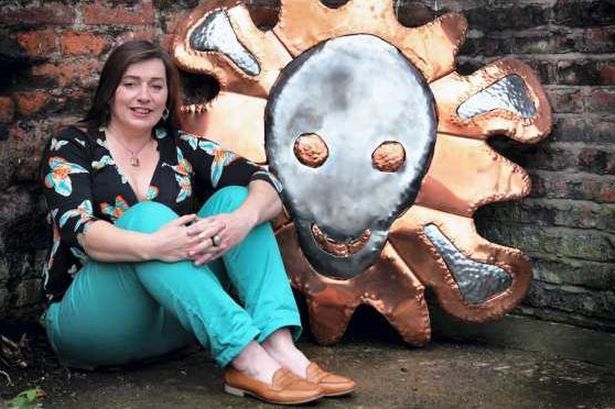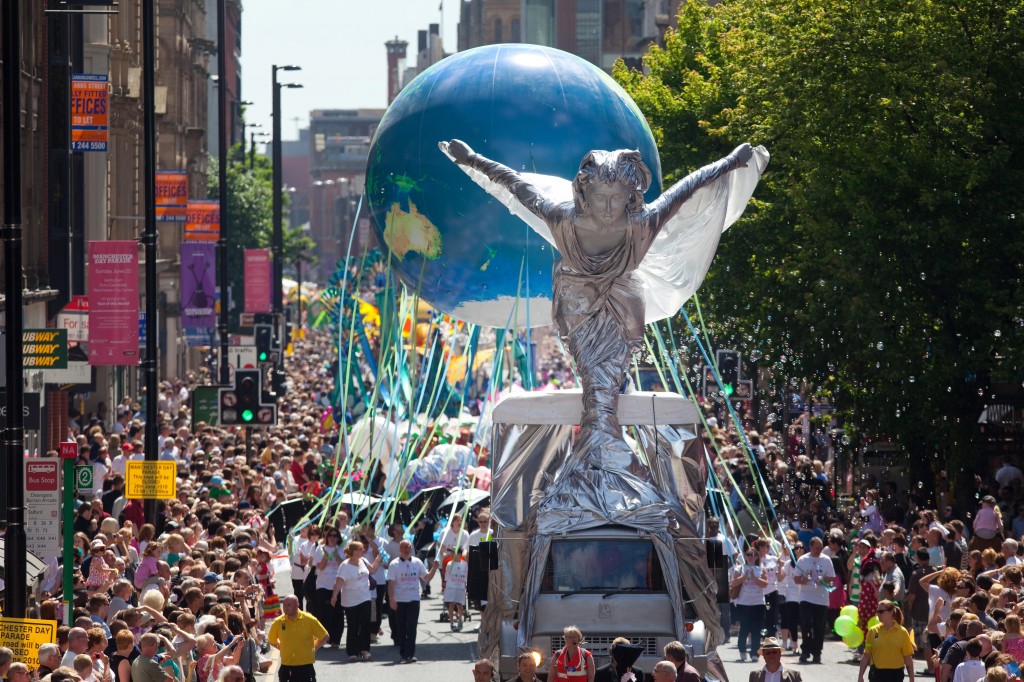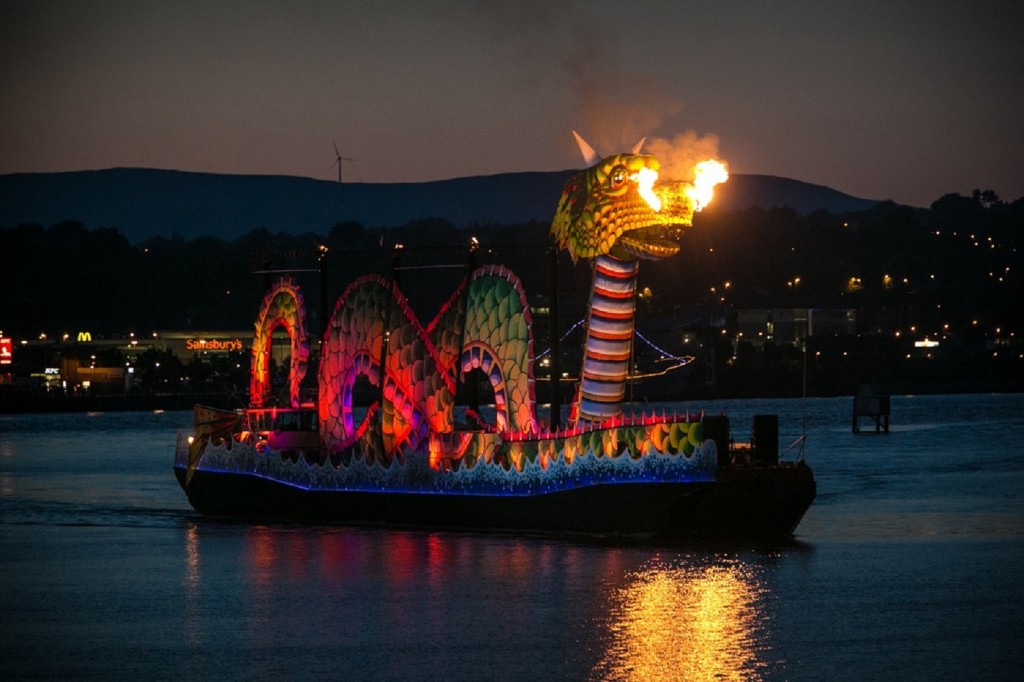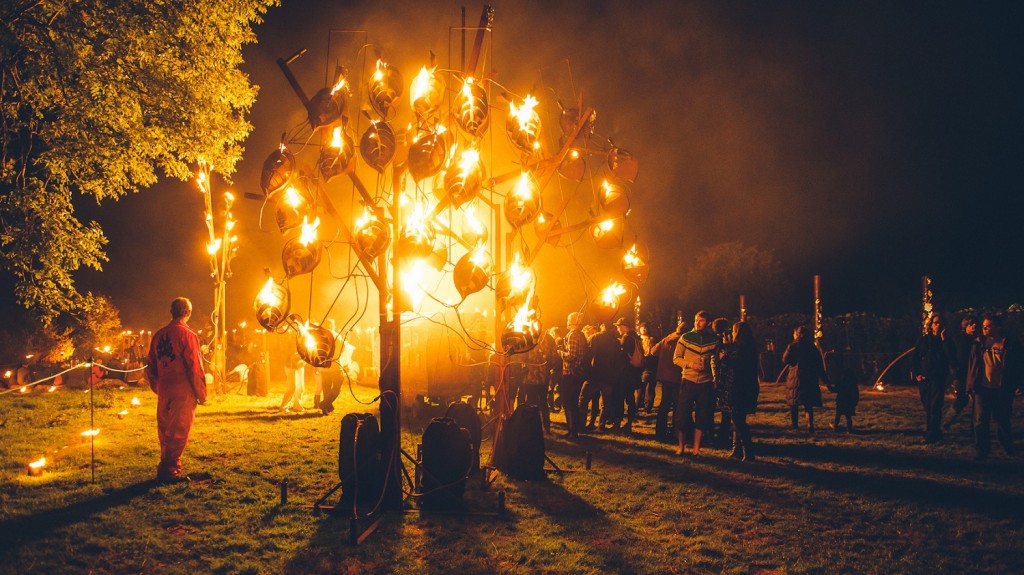Liz Pugh, co-founder of Walk the Plank

Liz talks about her extensive work in Outdoor Arts, some of the major productions she’s created and her reinvigorating trip to work the Ukraine. Liz is co-founder of Walk the Plank, one of the UK’s longest-standing and most influential companies, which began its life on a boat and was recently awarded a capital grant to develop their creation space in Salford. (First published: Apr 2014).
How did you get involved in Outdoor Arts?
Walk the Plank began with an idea for a touring theatre ship – hence the name – and for fifteen years we toured the UK with a team of theatremakers, giving many young people and children in remote ports and harbours their first taste of live performance.
As a producer and director, I’ve made shows for and in some amazing places: from beaches in Wales to harbours in Essex to the streets of Kyiv, Ukraine earlier this year, but what remains – after the audience applause dies and the de-rig is finished – is the positive experience that people tell us they have had in making something extraordinary happen. We work on a scale that is usually larger than most people can imagine. This means that everyone involved: artists, participants, volunteers and clients, need to embark on a journey of trust, which may take them out of their usual life into making a massive fire drawing hung from a crane or singing an anthem with 500 other singers on the Peace Bridge in Derry or carrying a flaming torch through the streets of Hull’s old town. And in that process, they become part of something spectacular and heartfelt, epic and personal – all at the same time.

What’s your most bizarre memory of Outdoor Arts?
We collaborate a lot with other artists and companies who make work of varying scale; and that sense of being able to call on the skills of experienced ‘Grand Masters/Mistresses’ of street arts or bring in the agility and energy of young artists or work with fantastic choreographers and carnival artists, is one of the best things about our world. Not to mention the promoters who commission us, support us or help us out of tight spots when over-ambitious moments don’t work out quite as planned.
There are many stand-out moments from making work around the UK over the past 25 years: one of the more bizarre memories involves Stansted Airport and a team of performers which included Mandy and Dave from The Grand Theatre of Lemmings, Joe Fleming from Circadian and, in the finale show, Ian Smith of Mischief La-Bas as host for a game show involving two giant puppets and an audience of 15,000 – all part of Sparks Will Fly, created by Walk the Plank for Essex County Council and Chelmsford City Council in 2012.
The airport had lent us the world’s most expensive helicopter in order to stage the arrival of a fictional character. The helicopter taxied down the runway, where our stilted protagonist and his costumed entourage climbed out to be met – deadpan with much handshaking – by an assembled collection of civic dignitaries and press, as the Essex Pipe and Drum Band played a fanfare. I think that illustrates the territory of ‘What If…’ that we occupy most of the time when making shows: what if one of our characters could actually arrive by plane? Never expecting to end up with the Sikorsky helicopter that had carried Will.I.Am around the day before!
What’s your top tip to someone wanting to work outdoors for the first time?
Running a theatre ship, and subsequently doing all sort of shows in docks, harbours, canals and lakes has taught me that if you want to work on water, double the budget and double the time you allocate to any task – in terms of rigging or rehearsing or moving performers around on small fiery boats.
What do you think are the opportunities available now for the sector over the next 4 or 5 years?
I’m not sure that the Outdoor Arts world is actually a ‘sector’ and it’s certainly not an artform, but I think artists who want to develop their own practice and think about how their work reaches out and touches audiences – which may be through where they choose to locate it or it may be about how they choose to make it – often want to explore interesting sites or make work in the public realm. For those who want to engage in new ways with communities, and who are willing to let their process become a dialogue with audiences and participants, I think there are interesting opportunities through the various Creative People and Places initiatives.
We’ve just finished our second term as Artistic Directors of Hull’s Freedom Festival, and we’re really excited about how to build on our partnership with Roots and Wings, Hull’s Creative People and Places project, to commission more artists to create installations and performances and parades that respond to Hull’s distinctive landscape of derelict fruit market warehouses, the staithes and snickets along its old waterfront, and its people – direct, warm and really open to outdoor work: ask anyone from Acrojou or NoFit State or Thingumajig or Walk the Plank who worked there this year…Hull yeah!

How are you planning to face the current challenges and make the most of future opportunities?
At Walk the Plank we are always looking to develop the skills and ambitions of the next generation. We try to build learning into most of the work we do: so we offer Master Classes linked to the Manchester Day Parade, and training schools linked to projects. The next one will be in Wales, linked to a commission to mark the tenth anniversary of the Wales Millennium Centre.
That sense of passing it on is fundamental to how we work, but it means we rarely stay in one place for long.
How do you follow what’s happening in the world?
I use Twitter a lot: I love that I can follow all sorts of people worldwide, people I will never meet, but through Twitter I get a glimpse of their worlds – from Astronaut Nicole on the ISS to a desi bhangra DJ in Mumbai. I try to make sure I’m signed up to newsletters of diverse organisations: from weird festivals and strange carnivals, to publications like Dezeen (good on architecture) or the British Library’s blogs.
I also follow various blogs through my own blog which I started when I was working in Kyiv and wanted to share something of the arts and culture of Ukraine with friends and family back in the UK.
What’s the best book/film/concert that you’ve encountered in the past 2 years?
The best thing I’ve done in the past two years was taking myself outside my comfort zone to work with the British Council for six months; I learnt loads, and realised how much we in Western Europe take our freedoms – of movement, speech, thought – for granted. I would encourage all artists and cultural practitioners to think about how they might internationalise their practice, and look beyond western Europe to do that. There’s very little money in countries like Ukraine to support their own independent artists let alone the touring of relatively wealthy western European companies, so you need to think about it differently, but there’s a huge appetite for people with ideas and great work.



